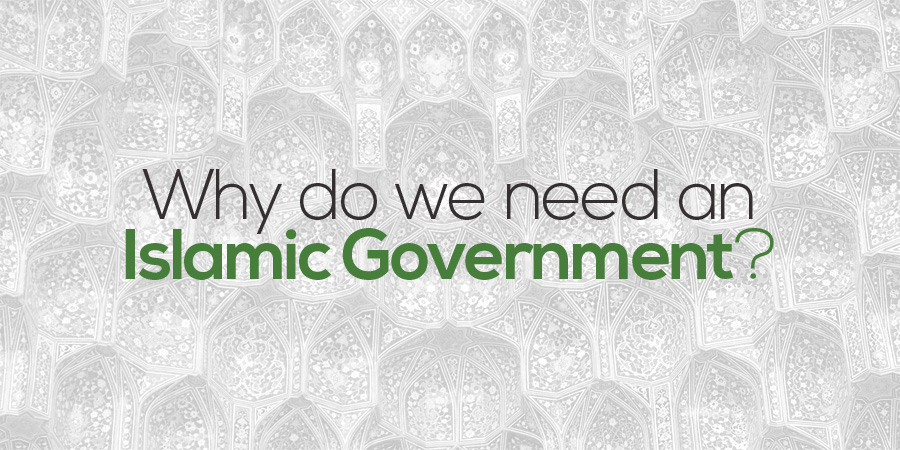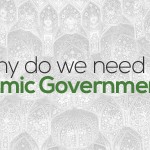Why Do We Need an Islamic Government? (3)

The ordinances pertaining to preservation of the Islamic system and defense of the territorial integrity and independence of the Islamic ummah1 also demanded the formation of a government. An example is the command: “Prepare against them whatever force you can muster and horses tethered” (Qur’an, 8:60), which enjoins the preparation of as much armed defensive force as possible and orders the Muslims to be always on the alert and at the ready, even in time of peace.
If the Muslims had acted in accordance with this command, and after forming a government, made the necessary extensive preparations to be in a state of full readiness for war, a handful of Jews would never have dared to occupy our lands and to burn and destroy the Masjid al-Aqsā2 without the people’s being capable of making an immediate response. All this has resulted from the failure of the Muslims to fulfill their duty of executing God’s law and setting up a righteous and respectable government.
If the rulers of the Muslim countries truly represented the believers and enacted God’s ordinances, they would set aside their petty differences, abandon their subversive and divisive activities, and join together like the fingers of one hand. Then a handful of wretched Jews (the agents of America, Britain and other foreign powers) would never have been able to accomplish what they have, no matter how much support they enjoyed from America and Britain. All this has happened because of the incompetence of those who rule over the Muslims.
The verse: “Prepare against them whatever force you can muster” commands you to be as strong and well-prepared as possible, so that your enemies will be unable to oppress you and transgress against you. It is because we have been lacking in unity, strength, and preparedness that we suffer oppression and are at the mercy of foreign aggressors.
There are numerous provisions of the law that cannot be implemented without the establishment of a government apparatus; for example, blood money, which must be exacted and delivered to those deserving it, or the corporeal penalties imposed by the law, which must be carried out under the supervision of the Islamic ruler. All of these laws refer back to the institutions of government for it is the government power alone that is capable of fulfilling this function.
After the death of the Most Noble Messenger (s), the obstinate enemies of the faith, the Umayyad3 (God’s curses be upon them), did not permit the Islamic state to attain stability with the rule of ‘Ali ibn Abi Tālib (‘a). They did not allow a form of government to exist that was pleasing to God, Exalted and Almighty, and to His Most Noble Messenger (s).
They transformed the entire basis of government, and their policies were, for the most part, contradictory to Islam. The form of government of the Umayyads and the Abbasids,4 and the political and administrative policies they pursued, were anti-Islamic. The form of government was thoroughly perverted by being transformed into a monarchy, like those of the kings of Iran, the emperors of Rome, and the pharaohs of Egypt. For the most part, this non-Islamic form of government has persisted to the present day, as we can see.
Both law and reason require that we not permit governments to retain this non-Islamic or anti-Islamic character. The proofs are clear. First, the existence of a non-Islamic political order necessarily results in the non-implementation of the Islamic political order. Then, all non-Islamic systems of government are the systems of kufr5 since the ruler in each case is an instance of tāghūt,6 and it is our duty to remove from the life of Muslim society all traces of kufr and destroy them. It is also our duty to create a favorable social environment for the education of believing and virtuous individuals, an environment that is in total contradiction with that produced by the rule of tāghūt and illegitimate power.
The social environment created by tāghūt and shirk7 invariably brings about corruption such as you can observe now in [some Islamic countries], the same corruption termed “corruption on earth.”8 This corruption must be swept away, and its instigators should be punished for their deeds. It is the same corruption that the Pharaoh generated in Egypt with his policies, so that the Qur’an says of him, “Truly, he was among the corruptors” (28:4).
A believing, pious, just individual cannot possibly exist in a socio-political environment of this nature, and still maintain his faith and righteous conduct. He is faced with two choices: either he commits acts that amount to kufr and contradict righteousness, or in order not to commit such acts and not to submit to the orders and commands of tāghūt, the just individual opposes him and struggles against him in order to destroy the environment of corruption. We have in reality, then, no choice but to destroy those systems of government that are corrupt in themselves and also entail the corruption of others, and to overthrow all treacherous, corrupt, oppressive, and criminal regimes.
This is a duty that all Muslims must fulfill, in every one of the Muslim countries, in order to achieve the triumphant political revolution of Islam.
Source: Islamic Government, Imām Khomeini
References:
- Ummah: the entire Islamic community, without territorial or ethnic distinction.
- Masjid al-Aqsā: the site in Jerusalem where the Prophet ascended to heaven in the eleventh year of his mission (Qur’an, 17:1); also the complex of mosques and buildings erected on the site. The chief of these was extensively damaged by arson in 1969, two years after the Zionist usurpation of Jerusalem.
- Umayyads: descendants of ‘Umayyah ibn ‘Abdu Shams ibn ‘Abdu Manāf from the Quraysh tribe, and members of the dynasty that ruled at Damascus from 41/632 until 132/750 and transformed the caliphate into a hereditary institution. Mu‘āwiyah, ibn Abū Sufyān frequently mentioned in these pages, was the first of the Umayyad line. This kingdom ended with the murder of Marwān II, the last Umayyad caliph. (Pub.)
- Abbasids: offspring of ‘Abbās ibn ‘Abdul Muttalib, uncle of the Holy Prophet (s), and the dynasty that replaced the Umayyads and established a new caliphal capital in Baghdad. This dynastic rule began in 132/750 with the caliphate of ‘Abdullāh as-Saffāh. With the rise of various local rulers, generally of military origin, the power of the Abbasids began to decline from the fourth/tenth century and it was brought to an end by the Mongol conquest in 656/1258. (Pub.)
- Kufr: the rejection of divine guidance; the antithesis of Islam.
- Tāghūt: one who surpasses all bounds in his despotism and tyranny and claims the prerogatives of divinity for himself, whether explicitly or implicitly. See also p. 78-79.
- Shirk: the assignment of partners to God, either by believing in a multiplicity of gods, or by assigning divine attributes and prerogatives to other-than-God.
- “Corruption on earth”: a broad term including not only moral corruption, but also subversion of the public good, embezzlement and usurpation of public wealth, conspiring with the enemies of the community against its security, and working in general for the overthrow of the Islamic order. See the commentary on Qur’an, 5:33 in Tabātabā’i’s, al-Mīzān, V, 330-332.

